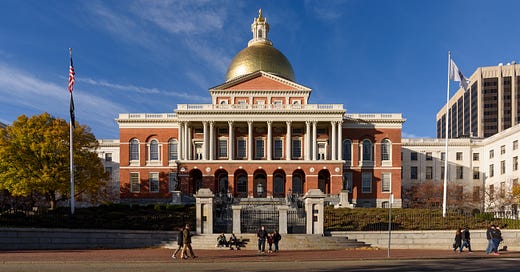Why Proposed Massachusetts Shelter Changes Won't Work
Most new provisions in the $425 supplemental budget are too little, too late.
Funding for the Massachusetts migrant crisis ran out almost a week ago. The $425 million supplemental budget being proposed by lawmakers hasn’t made it’s way to Governor Maura Healey yet but many of the provisions in the bill being hammered out by Democrats might not curb the migrant crisis as intended. Let’s break down what is being proposed.
Families waiting to see if they are eligible for shelter will not be able to stay in shelters while the state determines eligibility. Unless less there are more Biden planes that have been circling around since January, this proposal is two years too late. Furthermore, where would individuals actually stay while they were waiting to be processed? In our neighborhoods? In our public buildings? Back to Logan International Airport? It seems if migrants aren’t given a place to stay during the critical time it takes to learn more about them, there’s a good chance they will just fade into cities and towns with no way of knowing who or where they are.
Cutting down the amount of time families can stay in shelters from nine to six months. I have spoken to two different Massachusetts homeless women who have been served this notice while staying in a hotel shelter. Both of those women appealed the process twice and were extended for a period of months. Each was served a letter saying that if they did not leave the property by the final date, they would not be able to seek emergency shelter for at least a year. Ultimately, they were unable to find housing, even with RAFT assistance and are both now homeless.
Programs aimed to assist migrant families with securing housing outside shelters have had minimal success with less than 10 percent transitioning out of hotels. Without a plan in place to secure permanent housing, this provision would have migrant families homeless and create additional burdens in the communities where they will stay.
The bill would also include capping the system at just 4,000 families by the end of the year. Again, where’s the plan to secure housing?
This past week, I interviewed Massachusetts Congressman Jake Auchincloss and we discussed affordable housing.
“This state needs to build 250,000 units of housing. We’ve got to cut through all the red tape and just get things built.”
Last fall, Governor Healey signed The Affordable Homes Act and related initiatives that would “support the production, preservation and rehabilitation of more than 65,000 homes statewide over the next five years” but Auchincloss said it’s not enough:
“We need more boldness. There’s no question, we need more boldness.” Auchincloss doubled down on the ineffectiveness of programs intended to get families off the streets.
“An affordable housing voucher doesn’t help if it takes 8 years to get it.” The Congressman also lamented over a lack of affordable housing for non-voucher families. “If you’re middle class, and you’re not eligible for the voucher, it’s 60% of your wallet to pay for this house.”
The bill would also require families in shelters to “establish Massachusetts residency,” by showing they plan to stay in the state, whether that’s by showing they receive MassHealth or other public benefits, or with Massachusetts ID. I observed incoming migrants to a Massachusetts hotel shelter just hours after they arrived. Every family that came to the hotel was paired with representatives from the state and was signed up for MassHealth an public benefits include SNAP and cash assistance, even men who were not a part of a family unit. The redundancy of this provision is concerning.
Shelter residents would need to disclose their criminal histories. In what other capacity would we allow anyone in this state to go on an honor system when disclosing their criminal history? If I want to volunteer at my child’s school for the bookfair, I have to fill out a CORI check. Yet lawmakers think it would be a satisfactory solution to the rampant, documented domestic abuse, drug crime, sexual assaults and rapes occurring in our shelter by simply asking migrants to be honest? This particular provision is particularly offensive to taxpayers after Healey herself admitted that CORI checks were ordered but never conducted. Proper background checks would not only protect Massachusetts residents, but they could help to disconnect women and children from their domestic abusers. In the thousands of pages of incident reports from hotel shelters, the number one documented incident was that of domestic violence.
Massachusetts legislators need to go back to the drawing board and come back to taxpayers with a safer, more effective plan before they use more of our tax dollars to fund their migrant crisis.
The independent journalism of this Substack is sponsored by The Silva Funeral Home in Taunton, Massachusetts. Visit their website to learn more about their generations of providing care to our community when it is needed most.







Thank you for this article.
Great info and analysis. It seems like some bills are mostly written to signal a certain ideology, not primarily to fix or address real problems.